Amazon [amazon.com] has
77-Piece GearWrench Ratcheting Tap & Die Tool Set (SAE/Metric) on sale for
$106.24.
Shipping is Free.
Product Description from Store:
- Gearwrench Die adapter works on round and hex shaped dies
- Gearwrench Ratcheting T-handles wind dies with a 5° swing arc and have a reversing lever to eliminate hand-over-hand turning
- Twist lock guide system reduces the "walk back" of the die guide and keeps the dies centered while cutting
- Die adapters work with the 3/8inch Drive pass-thru ratchet and socket system as well as socket accessories
- Auto-locking feature allow the tap adapters to be removed safely
- Spring-loaded cap allows for quick release of large tap adapter
- Drive extension adapters provide greater access in confined areas when used with 3/8inch Drive extensions
- Ratcheting T-wrench works with GEARWRENCH pass-thru socket system
- Blow mold carrying case with tilted tap holders for easy access and storage
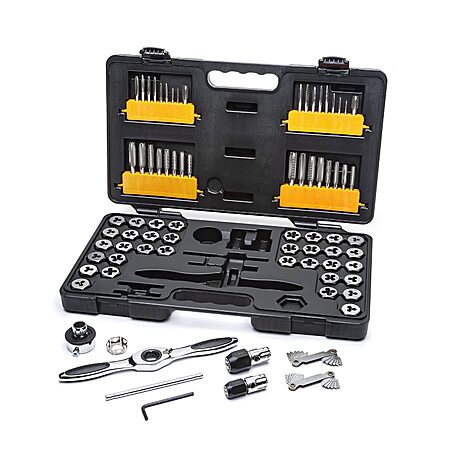
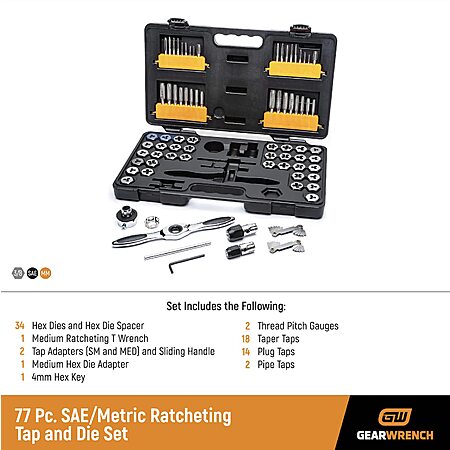
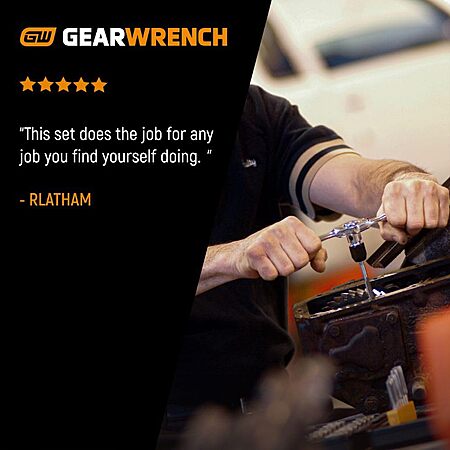
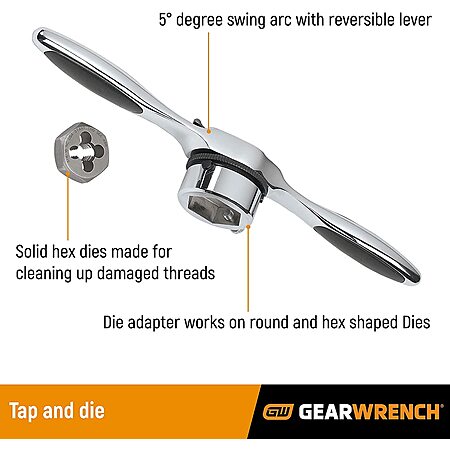
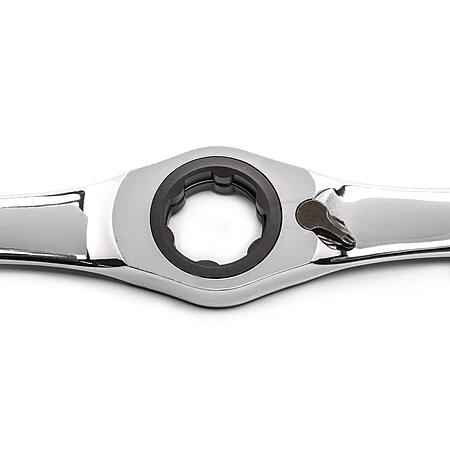
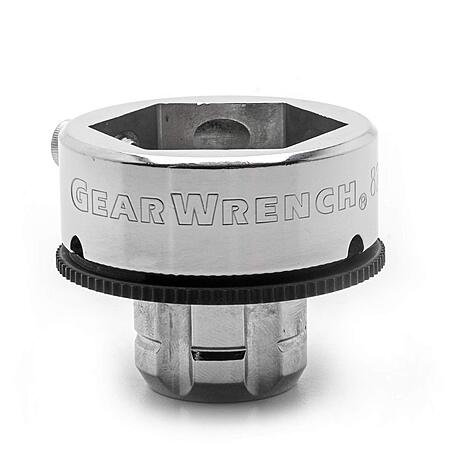
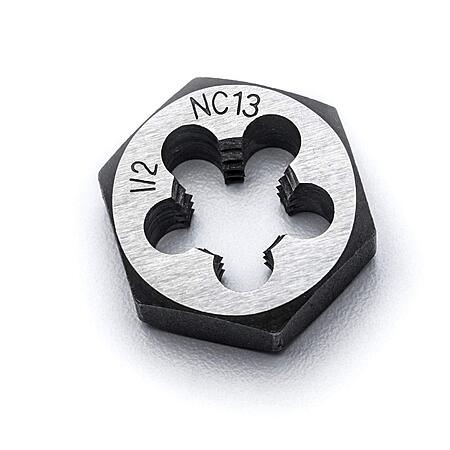
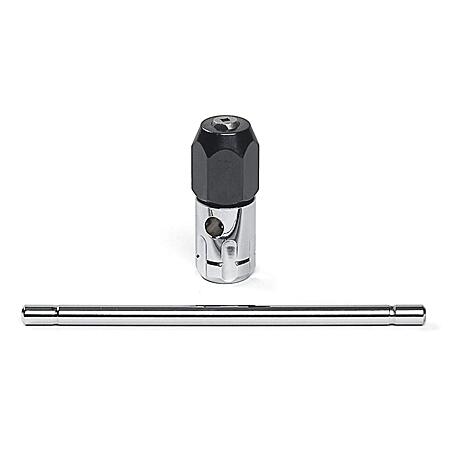
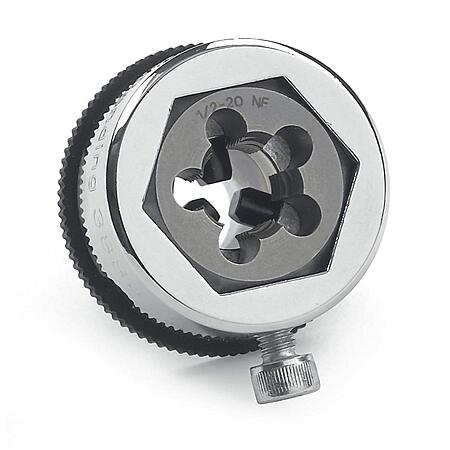
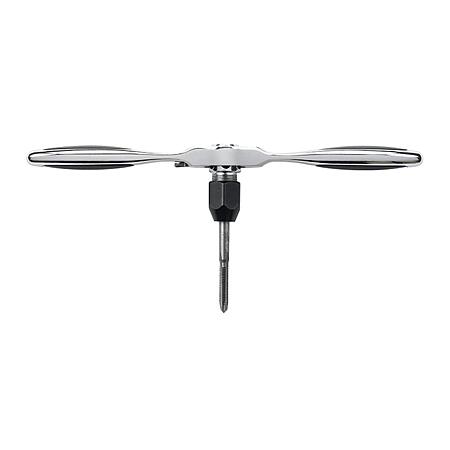





Leave a Comment
9 Comments
Sign up for a Slickdeals account to remove this ad.
Our community has rated this post as helpful. If you agree, why not thank Scoreracing
This 77 piece set is lowest price in a year but did get down into the $90s and $80s several times 2-3 years back.
Our community has rated this post as helpful. If you agree, why not thank mustangpony
Our community has rated this post as helpful. If you agree, why not thank Selman
These tap kits have some pros and cons. The pro is that you have it there when you think you will need it. The con is that they very well may not work. In my case with the hardened metal I had to buy a high quality tap. The metal would literally ruin the taps you often buy from Lowes, Home Depot, or could borrow from O'Reilley's. Then you have to consider your application. There are different styles of taps for through-holes versus blind holes. There are taper, plug, and bottoming taps. There are spiral point taps that shoot chips downwards for through holes and spiral flute taps that pull chips out for blind holes. The point is that tapping is a highly application specific activity.
If you are tapping mild steel, aluminum, plastic, or something soft maybe this makes sense. It might be perfect. If you are buying thinking it will cover your future unknown needs, I suggest maybe reconsidering. Quality taps can cost $20-60+ for one. There is zero chance you are getting that quality in a kit like this.
If you really need quality, I can recommend Emuge after being successful. Although I don't have experience with this brand, another highly recommended brand was OSG.
These tap kits have some pros and cons. The pro is that you have it there when you think you will need it. The con is that they very well may not work. In my case with the hardened metal I had to buy a high quality tap. The metal would literally ruin the taps you often buy from Lowes, Home Depot, or could borrow from O'Reilley's. Then you have to consider your application. There are different styles of taps for through-holes versus blind holes. There are taper, plug, and bottoming taps. There are spiral point taps that shoot chips downwards for through holes and spiral flute taps that pull chips out for blind holes. The point is that tapping is a highly application specific activity.
If you are tapping mild steel, aluminum, plastic, or something soft maybe this makes sense. It might be perfect. If you are buying thinking it will cover your future unknown needs, I suggest maybe reconsidering. Quality taps can cost $20-60+ for one. There is zero chance you are getting that quality in a kit like this.
If you really need quality, I can recommend Emuge after being successful. Although I don't have experience with this brand, another highly recommended brand was OSG.
I'm considering a set like the Gearwrench just to have a spare at home for mild steel (and softer material) for 'on the spot fix-it' tasks.
Years ago however, had to drill holes and tap small/common 1/4-20 threads in some AR400 steel and the only tap that would do it was an Emuge 1/4-20 at about $25 each IIRC for that small booger.
If you tried to tap it with these taps you'd see all the cutting threads of your brand new Gearwrench tap just disintegrate into tiny chips.
These tap kits have some pros and cons. The pro is that you have it there when you think you will need it. The con is that they very well may not work. In my case with the hardened metal I had to buy a high quality tap. The metal would literally ruin the taps you often buy from Lowes, Home Depot, or could borrow from O'Reilley's. Then you have to consider your application. There are different styles of taps for through-holes versus blind holes. There are taper, plug, and bottoming taps. There are spiral point taps that shoot chips downwards for through holes and spiral flute taps that pull chips out for blind holes. The point is that tapping is a highly application specific activity.
If you are tapping mild steel, aluminum, plastic, or something soft maybe this makes sense. It might be perfect. If you are buying thinking it will cover your future unknown needs, I suggest maybe reconsidering. Quality taps can cost $20-60+ for one. There is zero chance you are getting that quality in a kit like this.
If you really need quality, I can recommend Emuge after being successful. Although I don't have experience with this brand, another highly recommended brand was OSG.
What type of tap should make "Easy Work" of that material when properly drill sized, tapping lubricant is used, as well as other best practices?
Need a tap that will cut that material without complaining. Is a "Cobalt" tap a required option? Is there a affordable selection for just a handful of holes needed to make DIY manufacture this small part? A basic / mid grade tap doesn't seem to be effective on that material, loosing the edges on the cutting flutes...
I need a Robust threaded insert for a 3D print if the application is helpful to further describe the part being made.
These tap kits have some pros and cons. The pro is that you have it there when you think you will need it. The con is that they very well may not work. In my case with the hardened metal I had to buy a high quality tap. The metal would literally ruin the taps you often buy from Lowes, Home Depot, or could borrow from O'Reilley's. Then you have to consider your application. There are different styles of taps for through-holes versus blind holes. There are taper, plug, and bottoming taps. There are spiral point taps that shoot chips downwards for through holes and spiral flute taps that pull chips out for blind holes. The point is that tapping is a highly application specific activity.
If you are tapping mild steel, aluminum, plastic, or something soft maybe this makes sense. It might be perfect. If you are buying thinking it will cover your future unknown needs, I suggest maybe reconsidering. Quality taps can cost $20-60+ for one. There is zero chance you are getting that quality in a kit like this.
If you really need quality, I can recommend Emuge after being successful. Although I don't have experience with this brand, another highly recommended brand was OSG.
What type of tap should make "Easy Work" of that material when properly drill sized, tapping lubricant is used, as well as other best practices?
Need a tap that will cut that material without complaining. Is a "Cobalt" tap a required option? Is there a affordable selection for just a handful of holes needed to make DIY manufacture this small part? A basic / mid grade tap doesn't seem to be effective on that material, loosing the edges on the cutting flutes...
I need a Robust threaded insert for a 3D print if the application is helpful to further describe the part being made.
Are you tapping the M6x1.0 by hand or do you have some type of vertical tap holder? If by hand your going to want a 4-flute tap because the core of the tool will be larger which increases overall rigidity and strength. If you have a vertical tap setup that maintains orientation and allows you to focus on a consistent rotating speed then you can go with a 2 or 3-flute.
Is the hole blind or thru? Spiral point vs spiral flute style tap, but if you're taping by hand (i.e. holding it by and a d maintaining some vertical nature while turning) I wouldn't recommend a spiral flute as they are focused as machining taps. Handing tapping with a spiral flute usually results in the same stresses on the core as twisting and un-twisting a spring.
What's your workholding? How rigid?
The 8.8 rating is denoting the strength of the bolt, not hardness. I'm mentioning this because your tap method is what will break your tap on a greater scale over the tap and the material. Drill the appropriate tap hole size, 5mm (.196) or a #7 (.201). Make sure you drill straight. Chamfer the top edge as even as possible. As mentioned in another comment, lube with a tapping oil/paste. Pending your hole depth you'll be able to do 2-3 full revolutions going in, but you'll need to back it all the way out and clear the chips if it isn't a thru hole. Going back in, add some more lube.
My class does quite a bit of additive prototyping and I'm not able to imagine the purpose of the double thread. Do you need double adjusters?Why not press a hex nut into the part? Did you increase the # of walls where your M10x1.5 pre-hole exists? Typical shell numbers default to two (2) at about .010/shell wall. .020 wall with a bolt that has .051 thread height.
I apologize for the lengthy comment, my class comes across these scenarios frequently and we have an open forum discussion on process improvement to discuss, but all the information has to be present to succeed. What was mentioned before was just the tip of the iceberg of that discussion.
Sign up for a Slickdeals account to remove this ad.
https://www.homedepot.c
Leave a Comment